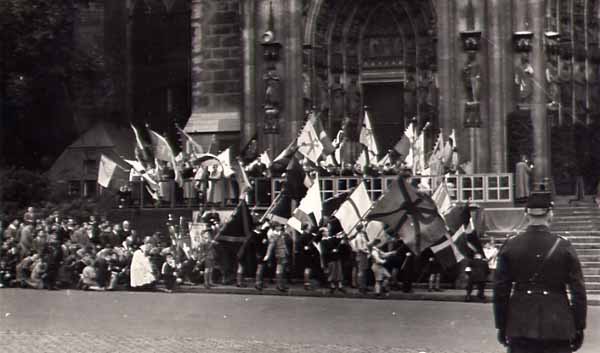
In Germany, the great age of song came in the nineteenth century. From the 15th century come three large song collections compiled in Germany: the Lochamer Liederbuch, the Schedelsches Liederbuch, and the Glogauer Liederbuch. The late-fourteenth-century composer known as the Monk of Salzburg wrote six two-part lieder which are older still, but Oswald's songs (about half of which actually borrow their music from other composers) far surpass the Monk of Salzburg in both number (about 120 lieder) and quality. The poet and composer Oswald von Wolkenstein is sometimes claimed to be the creator of the lied because of his innovations in combining words and music. The German word Lied for "song" (cognate with the English dialectal leed) first came into general use in German during the early fifteenth century, largely displacing the earlier word gesang.

Examples include settings by Joseph Haydn, Wolfgang Amadeus Mozart, Ludwig van Beethoven, Franz Schubert, Robert Schumann, Johannes Brahms, Hugo Wolf, Gustav Mahler or Richard Strauss.įor German speakers, the term "Lied" has a long history ranging from twelfth-century troubadour songs ( Minnesang) via folk songs ( Volkslieder) and church hymns ( Kirchenlieder) to twentieth-century workers' songs ( Arbeiterlieder) or protest songs ( Kabarettlieder, Protestlieder). It later came especially to refer to settings of Romantic poetry during the late eighteenth and nineteenth centuries, and into the early twentieth century. The earliest lied date from the late fourteenth or early fifteenth centuries, and can even refer to Minnesang from as early as the 12th and 13th centuries. The poems that have been made into lieder often center on pastoral themes or themes of romantic love. The term is used for any kind of song in contemporary German, but among English and French speakers, lied is often used interchangeably with " art song" to encompass works that the tradition has inspired in other languages as well.

'song') is a term for setting poetry to classical music to create a piece of polyphonic music.

In Western classical music tradition, Lied ( / l iː d, l iː t/, plural Lieder / ˈ l iː d ər/ German pronunciation:, plural, lit. For other uses, see Lied (disambiguation).


 0 kommentar(er)
0 kommentar(er)
